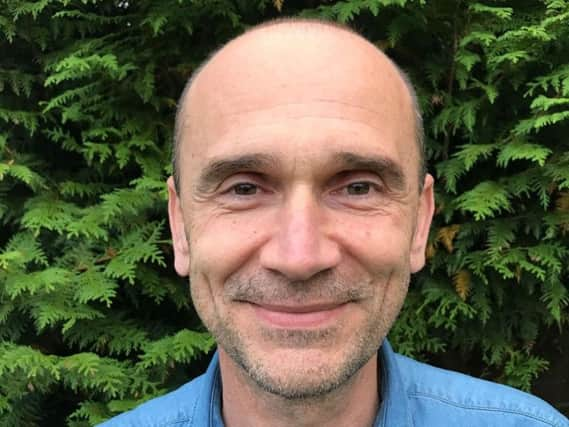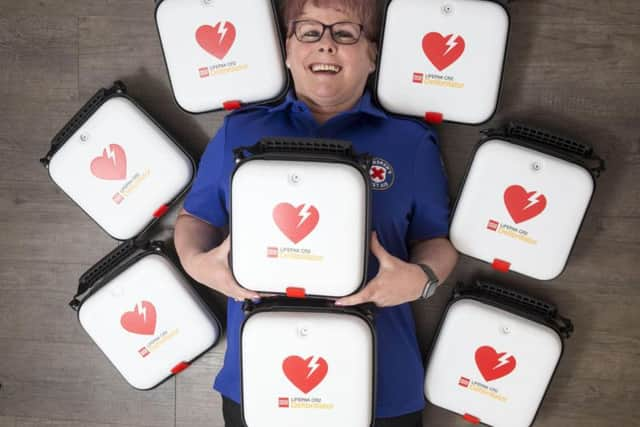New law aims to increase cardiac arrest survival rates with register of all public defibrillators


Proposals for a Member’s Bill to ensure that defibrillators are registered, so 999 emergency call handlers know where they are installed, have been announced today by Scottish Labour MSP Anas Sarwar.
Mr Sarwar, who was until recently his party's health spokesperson, said his Bill could transform the survival chances for people when their heart suddenly stops.
Advertisement
Hide AdAdvertisement
Hide AdThe AED Registration Bill aims to introduce a legal requirement for all public Automated External Defibrillators (AEDs) to be registered with the Scottish Ambulance Service. This would allow 999 operators to identify the nearest public defibrillator for bystanders.


There are currently around 3,500 out-of-hospital cardiac arrests in Scotland every year where resuscitation is attempted, and in only one-in-12 of those cases will the person survive.
Today, the move to have legislation requiring the devices be registered, was welcomed by heart attack survivor Milo Dragic, a 52-year-old IT worker from Edinburgh, who suffered a cardiac arrest when playing a doubles tennis game in July 2017 with his son and friends.
His heart and breathing stopped but his fellow players knew how to perform CPR and carried it out for 20 minutes to keep him alive as the club had no defibrillator.
Mr Dragic, who made a full recovery and has been raising funds to have a device installed at his tennis club, said: “I would like to see more people learning CPR, and it should be taught in every school.
“But if people do not know CPR, they do not need specialist skills to use a defibrillator, and a registration programme to ensure people can access a nearby AED could dramatically increase survival rates.”
He added: “I am forever grateful to my rescuers and hospital staff who looked after me so well. I was very lucky and I want to do what I can to help others have the same positive outcome from a cardiac arrest. Today I’m feeling well and back to full fitness, but too many other people don’t have that second chance."Every minute without CPR or defibrillation leads to a 10 per cent decrease in the patient’s chances of surviving, meaning the use of AEDs can dramatically improve survival rates - in fact with CPR, easily accessible defibrillators double the chance of surviving in some cases.
But international evidence has shown that the rate of AED use in an out-of-hospital cardiac arrest is a low as 4.3 per cent. A study in Sweden found that registered AEDs were 15 times more likely to be used in a life-saving scenario than unregistered AEDs.
Advertisement
Hide AdAdvertisement
Hide AdHowever, there is currently no legislation in Scotland governing the registration of AEDs, with purchasers only asked to register them with the Scottish Ambulance Service on a voluntary basis. There are around 1,900 AEDs voluntarily registered in Scotland.
Mr Sarwar said his proposed Bill would place a duty on vendors, purchasers and guardians of public AEDs to ensure that they are registered as soon as feasibly possible following their purchase with the Scottish Ambulance Service.
He said: “This proposal could dramatically improve survival rates in Scotland.
“The evidence of the positive impact of using a defibrillator is overwhelming, doubling survival chances in some cases.
“But there is no current requirement for public AEDs to be registered, meaning the ambulance service may direct a bystander to a defibrillator which is further away, or they may not even be aware of one in the vicinity.
“This Bill would help bystanders save the lives of their fellow citizens and allow Scotland to lead the way in out-of-hospital cardiac arrest survival.
“I look forward to working with others to get this Bill on the statute books.”
Advertisement
Hide AdAdvertisement
Hide AdA consultation on the proposal will be launched in the coming weeks, and it will seek views on whether registration should be mandatory.
Daniel Jones, British Heart Foundation (BHF) Scotland policy and public affairs officer, said: “BHF Scotland welcomes the launch of this consultation. This represents the first national conversation on the registration of publicly accessible defibrillators (PADs) and we will take a keen interest in the responses and encourage all guardians of PADs to share their views.
“Survival rates from out-of-hospital cardiac arrests in Scotland are worryingly low, with less than one in twelve people surviving. Alongside CPR, easily accessible defibrillators double the chance of surviving in some cases. Opportunities to help save a life are often missed because no one knows where the nearest defibrillator is.
“It’s vital that every defibrillator is registered with the Scottish Ambulance Service so that lives are not needlessly lost.”
